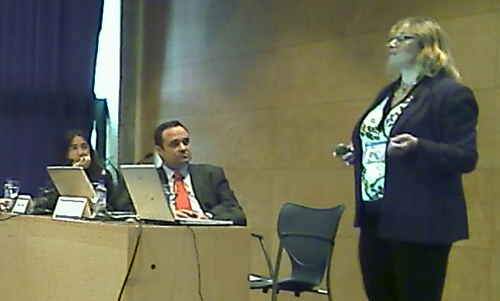The Congress on Internet, Law and Politics has the aim of continuing the task of reflecting on, analyzing and discussing the main changes taking place in law and politics in the information society. This third congress focuses on the questions that currently represent the most important challenges and new developments in the fields of copyright, data protection, Internet security, problems of responsibility, electronic voting, and the new regulation of e-Administration, as well as dedicating a specific area to the current state of the use of new technologies by law professionals.
From Casual Censorship to Cartelisation? ISP Control of Illegal and Harmful Content
Lilian Edwards, Professor of Internet Law. Law School, University of Southampton
If you want to regulate content, you first go to Internet Service Providers (ISPs). And there is a big difference among information stored for transiently issues (transmission, caching) it becomes hosting, and thus legal issues apply.
A “notice and take down” regime, based on that there is no criminal liability if there is no atual knowledge of illegal activity or information, and no civil liability without actual knowledge or awareness of facts or circumstances from which illegal activity or information is apparent, and there is no active seek or profit.
But what really happens when a notice to take down takes place? What does the ISP do? What can be done? Are ISPs becoming “censors” or “arms of the state”? If they don’t do anything… are they pornographers? The AHRC Centre in IP and Technology carried on a survey to shred some light.
Institutionalisation: ISPs cut down costs of transaction of court procedures, as they easy enable both taking down i.e. pirate content and ID disclosing of major uploaders.
Cartelisation: The Internet Watch Foundation was originally created to defend ISP industry from threatened police action for carrying illegal newsgroup content. Thus, it acts as a self regulation device.
What’s next? potential for perfect invisible censorship? from self regulation to co-regulation? Specially when instead of child porn (the subject of IWF) we go no “not that clear” issues like racism or gender discrimination.
The results of the survey are not (statistically) significant, but (intuitively) quite enlightening. There are quite huge variations in the number of NTD claims received; traditional media usually get “defamation” complaints; etc. But… do they take down content? No, they not automatically do it. Instead of removing a whole website because of just one file (difficult for the ISP to find), they would “NTD” the owner of the site to do it in their place.
And no, ISPs don’t usually ask third parties (i.e. lawyers) if the NTD was legally right or appropriate, partly because there was not corporate people or knowledge about legal issues.
There is also little enthusiasm for “cartelised” behaviour.
On the other hand, main exchange of illegal content happens outside websites, but through instant messaging or P2P networks that make tracking very difficult. Hence, is there any sense on ISPs wasting their time in web filtering? And if this has a cost (as it does) and you have to cut down costs, where would you begin with if your core activity is in selling hosting, not in content controlling? But, surprisingly (from a profit point of view), ISPs actually care for “values”, and they care and collaborate because of personal bounds among flesh-and-bone persons ruling ISPs.

Left to right: Raquel Xalabarder, Miquel Peguera, Lilian Edwards
Liability of middlemen: state of the question 5 years after the LSSICE
Miquel Peguera, Professor of Mercantile and New Technology Law, UOC School of Law
Professor Peguera explains some well-known court cases related to ISP liability in Spain.
One of the main things that he puts clear is that it does not seem that anyone (lawyers, judges, infringers and offended parties) is perfectly aware of how the law works, with stress in the point where there is or there is not liability for ISPs, which is specially sad in the case of lawyers and judges.
3rd Internet, Law and Politics Congress (2007)
If you need to cite this article in a formal way (i.e. for bibliographical purposes) I dare suggest:
Peña-López, I. (2007) “3rd IDP Congress on Internet, Law and Politics. Briefings, part II: Responsibility for content on the internet: state of the art and new perspectives” In ICTlogy,
#44, May 2007. Barcelona: ICTlogy.
Retrieved month dd, yyyy from
https://ictlogy.net/review/?p=539
Previous post: 3rd IDP Congress on Internet, Law and Politics. Briefings, part I: Jonathan Zittrain keynote speech
 RSS feed for comments on this post.
TrackBack URI
RSS feed for comments on this post.
TrackBack URI

